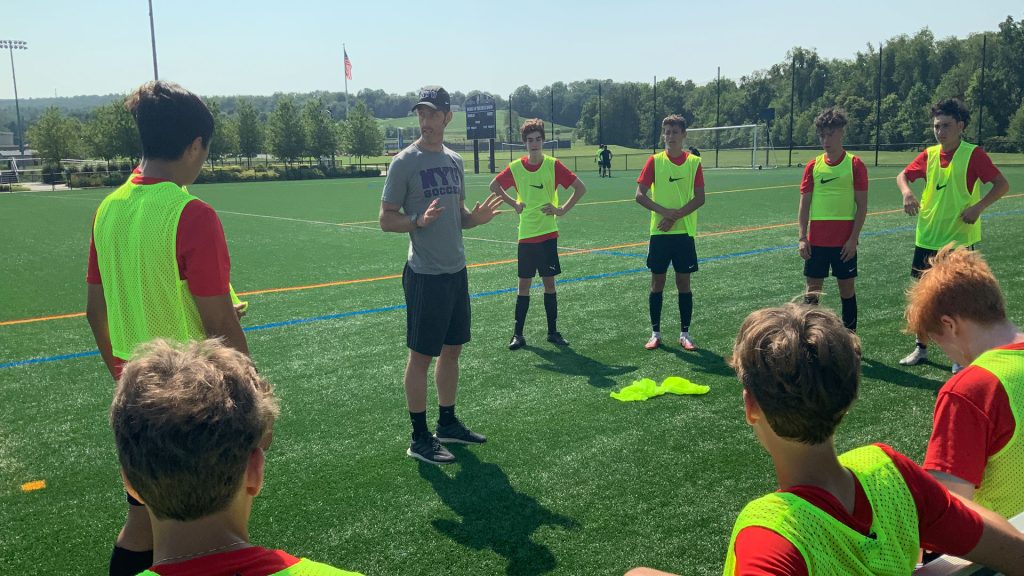You can’t get recruited for college soccer playing only for your high school team.
Or can you?
There’s a lot of skepticism surrounding this, but this is quite possible if you are determined, focused, and ready to go that extra mile. What separates you from all those players who want to be on that college roster isn’t just the talent.
More so, it’s all about grit, attitude, and being proactive in the whole process of recruiting.
Here’s a step-by-step guide on how to make your college soccer dream come true, and it all starts when you are still in high school.
1. Early Start
Skill development is the backbone to your journey in college soccer. You can’t dive into the recruitment process without first building up what you have to bring onto the field.
College coaches are not looking for decent players; they’re looking for players that are technically skillful, tactically aware, game-intelligent athletes who carry an appropriate athletic profile.
Here’s where to focus:
Develop the Basics: Passing, dribbling, shooting, defending-whichever skill one masters is definitely bound to make a difference.
Improve Physical Fitness: Soccer is certainly not for sissies. It’s an extremely demanding sport-it asks for agility, speed, stamina, and a sizeable amount of toughness.
Achieve this through cardio exercises regularly, agility drills, and strength training.
Study Game Strategies: The smartest players have a mental edge-they know the formations, analyze opponents, and adjust their style according to the flow of the game.
Watch soccer with a purpose-study different formations and see where players are positioned. Coaches love players who have game intelligence.
This is not something that you can develop overnight; these skills take time, so start early and be consistent. Let your passion for improvement show.
Hard work is one of the few things that always pays off.
2. Attend College ID Camps

If you’re only playing high school or even club soccer, it’s tough to get on a coach’s radar. The College ID camps are like open casting. They get to see how you handle pressure, whether you are a good teammate, or if you have that “something” they are looking for.
Here’s how you can get the best out of college ID camps
Plan Ahead: Most colleges run their ID camps in the summer. You can register for two or three, preferably those school programs you are really interested in attending.
Sell Your Strengths: College ID camps should be the perfect showcase for the best of what you do. This could be your defensive talent, your speed, or your game IQ; let the coaches know what you bring to the table.
Follow Up after the Camp: A quick email or note afterwards thanking them is not only respectful but may leave a lasting memory.
And of course, bring your A-game. Coaches see hundreds of players at these events, so give them something to remember you by.
CHECK OUT | Best Youth Soccer Clubs in Michigan for Aspiring Players
3. Network and Build Relationships with Coaches
It kind of sounds intimidating, but it is one of the most effective ways to break through the noise and connect with college coaches who could be your future mentors.
While you might feel a little awkward reaching out at first, remember: most coaches appreciate the effort, and even if they’re not interested, they’ll respect you for reaching out.
Here’s a roadmap to building these connections:
Do an introductory email just to let the coach know who you are and that you are interested in their program. Keep it short, friendly, and to the point. Mention your background with soccer, including any of your stats or achievements, and what excites you about their school.
Here is a very simple template from which you could start:
Hi Coach [Name],
I am YOUR NAME and am a POSITION from HIGH SCHOOL in CITY, STATE. I have been keeping up with the [School Name] soccer program and would be grateful to bring my talents into your team. I have experience in-relevant stats or highlights-and I am particularly drawn to-something unique about the program or school.
Thank you for taking the time, and I look forward to any opportunity to learn more about your program.
Best, [Your Name]
Be Consistent but Not Pushy: Sometimes follow up with emails to keep the relationship warm but not overbearing. A simple “checking in” email can work miracles.
Attend College Games If Possible: When possible, go to the games. It’s indicative of interest, and it’s an opportunity to view how they compete.
If you happen to meet a coach after a game, make sure to introduce yourself. Coaches remember a dedicated player who knows their program and is interested in them.
Networking is much less about the immediate results and more about being on the college soccer landscape. You never know who may reach out to you with an opportunity.
4. Play for a Local Club After Your Fall Season

High school soccer is okay, but college coaches tend to usually scout club players a lot more. Being on a local club lets you keep fit, work on your skills, and be seen in big tournaments.
Other benefits that come with playing club soccer include:
Yearlong Competition: Unlike high school soccer, club soccer tends to run all year long, affording you so much more time to play and hone your skills.
Exposure to College Scouts: A number of college coaches frequent club tournaments and showcases; playing well here is an opportunity to be seen by people that matter.
Quality Training and Coaching: Many club teams have dedicated coaches and trainers that a high school would not have. You will get more focused training that can seriously improve your game.
Club soccer will keep you fit and prepared for the next level and make you at an advantage compared to those players who played only in high school.
CHECK OUT | Fun Soccer Drills for 5-Year-Olds: The Ultimate Guide
5. Keep Excel in Academics
If you are serious about playing college soccer, don’t fall behind in your grades. Good academic standing is as important to many college coaches as athletic prowess – especially if they are offering scholarships.
Playing college soccer is a balancing act; coaches want well-rounded people that will take on both the academic and the athletic commitment.
How to prioritize academics:
Stay Organized: Employ your time wisely. Make yourself a schedule that enables you to have time for school, training, and rest.
Ask for Help: If you’re not pulling great grades in a subject, ask for help early on. It reflects maturity and responsibility, qualities every coach loves to see.
Be Consistent: You might not be the best student in your class, but you have to be consistent. Good grades only show that you are responsible enough and that you can deal with being a student-athlete.
You will find it a little difficult balancing your sport and academics, but all the same, remain focused on each of them to make you a great recruit to college coaches.
6. Stay Committed and Never Stop Improving
Among the best ways to stick out in college recruitment is a very simple ability to show that you are good, but you are continually improving.
Coaches want players with potential and a hunger to get better. This kind of mindset and commitment separates you from those other players who might sit on their laureates.
Here’s how you should keep improving:
Study Game Film: Watch film to understand what I’m doing well and what I need to work on. It’s an open view of your game–like a mirror for your game.
Work on Strength and Conditioning: Always do some form of conditioning to stay healthy, not get hurt. Add in strength and flexibility with the conditioning drills.
Setting short and long-term goals: Set clear goals like increasing your speed or improving your shooting accuracy. These little targets will keep you going, and at the same time, help you to measure your progress.
Development on a long-term basis is equally essential to immediate performance. Show coaches that you’re committed in the long-term.
CHECK OUT | Fun Soccer Drills for 5-Year-Olds: The Ultimate Guide
7. Be Proactive: Take Charge of the Process
This is your journey. You’ll never have college soccer recruitment fall into your lap; you actually have to go out there and get it. Be proactive, stay organized, take charge, and own every step of the process.
Here’s how:
Make a Recruitment Plan: Writing down what you need to do each year or season-from going to camps to following up with coaches. Having a plan will, in itself make the process feel manageable.
Make a Highlight Reel: Coaches love highlight reels. Take the time to make a short video with all of the best moments when you are on the field, such as scoring, making plays, or bringing out your skills. This, you should share with coaches so that you can be remembered.
Use Online Platforms: Websites like NCSA and BeRecruited will let you connect with college coaches from all over the country. Upload your stats, video highlights, and academic info.
Meet Those Deadlines: There are application deadlines, scholarship paperwork, and registration for eligibility centers. One day/week/month can be costly in terms of missed opportunity; thereby, being prepared would better serve the candidate.
Wrapping It Up:
Recruiting for college soccer is a passionate, hard-working, and patient process. It may be a long journey, but each and every drill, each and every camp, and every email you send out forms the road to your future.
Keep working at your skills, keep up with your academics, and remember-no one else is going to make this happen for you; you’re the keystone in your recruitment.
Put these seven strategies together, and you’ll be off to a good start differentiating yourself from others, making connections, and hopefully landing a roster spot.
Stay dedicated, keep hustling, and prove to the coaches that you are not just another kid, but part of the important key to their future team.



